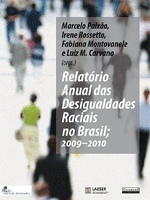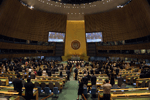Published on Fri, 2011-08-05 07:25
Sources: Los Angeles Times, Bloomberg, The New York Times “One stubborn fact was hard to ignore” at the International AIDS Society's annual meeting in Rome last month: the syndrome “remains a metaphor for inequality,” wrote Michel Sidibé, Executive Director of the Joint UN Programme on HIV/AIDS (UNAIDS) and Under-Secretary-General of the United Nations. His words are backed up by new studies on HIV that reveal the persistent gaps between poor and rich countries and between wealthier and marginalized communities in the United States. |
Published on Thu, 2011-08-04 08:48
Sources: O Estado de Sao Paulo; Abong. In Brazil infant mortality rates are a very clear indicator of the inequity between different ethnic and racial population sectors. According to the 2009-2010 Annual Report on Racial Inequality in Brazil from the Federal University of Rio de Janeiro (UFRJ), infant mortality among whites is 37.3 per thousand live births but among people of African descent the figure is 62.3. |
Published on Wed, 2011-08-03 07:28
Sources : Xtra!, Care2.com, Rabble.ca. Globalization has contributed to the destabilization and marginalization of women, but has also meant enhanced communications and organization and atransnational connectivity that must be united asorganizations and networks struggle to sustain themselves and maintain resilience in the face of forces that oppose equality. That became clear at Women's World, the conference in Ottawa that marked the 30th anniversary of the Women's World Congress and that brought together nearly 2,000 international activists, academics and policy makers from 92 countries over five days last month. |
Published on Tue, 2011-08-02 07:27
Sources: UN News Centre, IPS report, UNDP. The empowering of young people is becoming a key issue in the speeches of many UN high officers as the International Year of Youth is coming to an end this month. All of them agree that there is much to be done to include young men and women in the development and democratisation processes. |
Published on Mon, 2011-08-01 08:05
Source: CELS. The Center for Legal and Social Studies (CELS), the focal point of Social Watch in Argentina, has been awarded the Gruber Foundation Prize for Justice. This annual award has been in existence for ten years; it is given to people and organizations in the human rights field in all parts of the world. |
SUSCRIBE TO OUR NEWSLETTER







